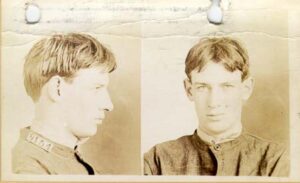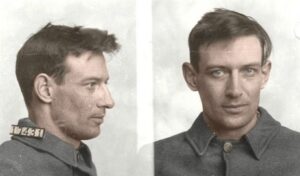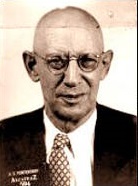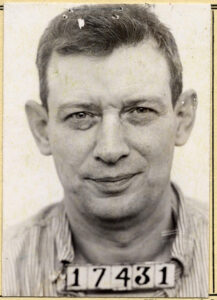
 First confined for killing a bartender in a brawl, Robert Stroud was sentenced to Leavenworth Federal Prison in Kansas, in 1909. His sentence was almost completed in 1916, when he stabbed a guard to death. Stroud claimed to have acted in self-defense, but in the end, he was convicted of the murder and sentenced to hang for the crime. Stroud’s mother was devastated, and she tried everything she could think of to have the sentence commuted to a lesser sentence. She was not having much success, until in desperation, she wrote a handwritten plea to President Woodrow Wilson, which finally earned Stroud a commuted sentence…with a twist. Stroud was now considered to be so dangerous that no one really wanted him to be allowed in the general population…especially not the guards. So, along with the sentence commutation came a stipulation…permanent solitary confinement. Most of us could not imagine spending the rest of our lives alone. The only people you might see would be a hand bringing you food. If that person chose not to be accommodating, they might not even speak to you, which means no true human contact. I don’t know if he had a television set later on, or a radio, but it could have been a very silent life.
First confined for killing a bartender in a brawl, Robert Stroud was sentenced to Leavenworth Federal Prison in Kansas, in 1909. His sentence was almost completed in 1916, when he stabbed a guard to death. Stroud claimed to have acted in self-defense, but in the end, he was convicted of the murder and sentenced to hang for the crime. Stroud’s mother was devastated, and she tried everything she could think of to have the sentence commuted to a lesser sentence. She was not having much success, until in desperation, she wrote a handwritten plea to President Woodrow Wilson, which finally earned Stroud a commuted sentence…with a twist. Stroud was now considered to be so dangerous that no one really wanted him to be allowed in the general population…especially not the guards. So, along with the sentence commutation came a stipulation…permanent solitary confinement. Most of us could not imagine spending the rest of our lives alone. The only people you might see would be a hand bringing you food. If that person chose not to be accommodating, they might not even speak to you, which means no true human contact. I don’t know if he had a television set later on, or a radio, but it could have been a very silent life.
With a death sentence averted, but another “almost as bad” sentence given, Stroud began serving solitary confinement. I guess he must have been allowed visitors, because for the next 15 years, he lived amongst the canaries that were brought to him by those visitors. I guess that is one way not to be completely alone. Stroud quickly became an expert in birds and ornithological diseases. His interest in birds actually began in 1920, when he found a nest of injured sparrows in the prison yard and raised them to adulthood, becoming the “Birdman of Leavenworth.” Basically, he was as happy as could be expected in solitary confinement, at least until he was ordered to give up his birds in 1931. I might be soft-hearted, and maybe the point is punishment, but making him give up the birds seemed like cruelty on top of punishment. They were his only companions!! Nevertheless, taking it in stride, Stroud redirected his energies to writing about the birds he loved. He later published his first book on ornithology two years later. For those who don’t know, and I was one, Ornithology is the scientific study of birds. I assumed it was just the study of the diseases that birds get. Truly, by the time Stroud was done, he knew everything there was to know about birds…and more, having lived among them too.
The book was a success, but the publisher was a crook. He failed to pay Stroud royalties, knowing that Stroud was barred from filing a lawsuit. That is just wrong, but undaunted, Stroud took out advertisements complaining about the situation. That didn’t help his situation, because prison officials retaliated by sending him to Alcatraz, the federal prison with the worst conditions. Serving one’s sentence is one thing, but abuse while in prison is clearly another. Stroud gained notoriety at Alcatraz too, being later nicknamed “Birdman of Alcatraz.”
Stroud gained widespread fame and attention when author Thomas Gaddis wrote a biography that heralded Stroud’s ornithological expertise. Then, in 1943, Stroud’s Digest of the Diseases of Birds, a 500-page text that included his own illustrations, was published to general acclaim. One might think that all this success would have made him feel better about himself, but in spite of his success, Stroud was depressed over the isolation he felt at Alcatraz. So many years alone, would take a toll on anyone. He attempted suicide several times, and 

 finally, on November 23, 1959, it was decided that he could come out of solitary confinement. He stepped out of that cell for the first time since 1916…42+ years of solitary confinement. Of course, freedom from solitary confinement didn’t mean freedom from the prison. November 21, 1963, at the age of 73, with no cause of death, Robert “Birdman of Alcatraz” Stroud died at the Medical Center for Federal Prisoners in Springfield, Missouri.
finally, on November 23, 1959, it was decided that he could come out of solitary confinement. He stepped out of that cell for the first time since 1916…42+ years of solitary confinement. Of course, freedom from solitary confinement didn’t mean freedom from the prison. November 21, 1963, at the age of 73, with no cause of death, Robert “Birdman of Alcatraz” Stroud died at the Medical Center for Federal Prisoners in Springfield, Missouri.


Leave a Reply